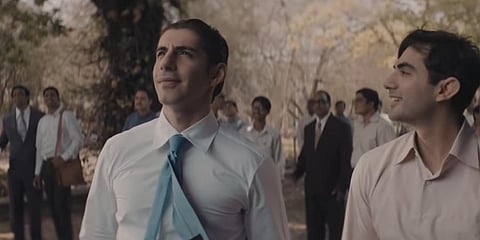

NEW DELHI: Debutant director Abhay Pannu, who has worked on the critically-acclaimed web series "Rocket Boy", says he wanted to talk about scientific development and nation-building in the country through the story of nuclear physicists Homi Bhabha and Vikram Sarabhai.
The SonyLIV series, which started streaming from February 4, maps the scientists' efforts in nuclear science and space programme while also showcasing an India on the cusp of freedom in the 1940s to a newly independent country trying to find its feet on the world stage.
"When I was in college, I wanted to tell a story about scientific development or nation-building in the country, not specifically about Dr. Bhabha and Dr. Sarabhai. I don't think we have made any story like this, which I felt is appalling," the director told PTI in an interview.
For Pannu, who studied engineering but left it all to pursue his dream as a filmmaker, it was a "conscious decision" to tell the story through an emotional lens rather than spouting scientific jargon.
"I'm an engineer by qualification and a very bad one at that. I feel India is a country where people decide what they want to do with their lives after they do engineering. I'm one of them," he quipped.
Pannu, who hails from a small Punjab village called Gulabewala and also spent a decade of his childhood in Jaipur, said he didn't want to present Bhabha and Sarabhai as unapproachable icons from a bygone era but as "relatable characters" who dream, fail and try again just like any other person.
"We wanted to reach out to as many people as possible, including the Gen Z's and millennials, who maybe didn't know about them before. The idea was to smartly put in the scientific achievement and nation-building in a human story so that people view them as normal people. What they did differently was that they dreamed bigger."
Pannu boarded the show, starring Jim Sarbh and Ishwak Singh as Bhabha and Sarabhai, in December 2019 as writer and director.
He worked as an associate director on "Mumbai Diaries: 26/11" alongside "Rocket Boys" creator Nikkhil Advani before this series.
The overwhelmingly positive response to the show has ensured that it will have a follow-up season and Pannu confirms that they are already through with 80 per cent of the shoot for season two.
"We have started the post-production," he said about the series, also produced by Monisha Advani and Madhu Bhojwani.
Some three years ago, writer Abhay Koranne pitched the idea to Siddharth Roy Kapur and he contacted Advani for a collaboration.
Advani, who has also produced the show via his Emmay Entertainment along with Roy Kapur Films, approached Pannu to direct "Rocket Boys".
The intention behind the series, the 30-year-old said, was to convey that even after all these years nothing much has really changed.
The trailer of the show, which premiered on February 4, also touches upon the India-China War of 1962 that prompts Bhabha to propose the development of the country's first atomic bomb.
"Times change, debates don't. The problems people face remain the same. Like, people falling in love, people falling out of love. Challenges like no budgets, sanctions from the country, war. The biggest example is the whole tension at the Indo-China border, it's still there. Ideas don't change, maybe they manifest themselves into something else a little bit," Pannu, who has previously assisted director Neeraj Pandey and worked at TVF, said.
"Rocket Boys" also stars Regina Cassandra as Bharatanatyam icon and Dr. Sarabhai's wife Mrinalini Sarabhai, and Rajit Kapur as Pt Jawaharlal Nehru, the first Indian prime minister.
The director said he has "dramatised" true events without glorifying anyone.
"I've not tried to shy away from showing what was happening in India at that point in time. I've not taken any sides."
The major events in the story are "all true", said Pannu, admitting that the conversations have been fictionalised.
The dialogues, penned by Kausar Munir, were approved by the Sarabhai family who were associated with the show since the beginning.
Bhabha has no family.
"We had a canvas and we had to paint within it. I could not have painted outside the canvas. What conversations these people had behind closed doors is something nobody knows about. That is something from our imagination."
There are also fictional characters like physicist Raza Mehdi, played by the ever-dependable Dibyendu Bhattacharya, and lawyer Parvana Irani, Bhabha's love interest essayed by Saba Azad.
Through Mehdi, the director said he wanted to subtly call out Islamophobia, class divide and favouritism.
"The character is based on a lot of people, not one person. He is an amalgamation of so many people from pre and post Independence who also wanted to do a lot for the nation but probably didn't get the opportunity."
The series is called "Rocket Boys" for a reason but the women here also get their dedicated arcs.
"I wanted to write them as characters that freely speak their mind. If the person they want to be with doesn't want to be with them, they move on with their life. When a person wants to start a Bharatanatyam academy and she's not getting the support that she wanted from her husband, she starts it herself anyway. There were firsts of so many... a woman lawyer, female Bharatanatyam dancer, freedom fighters, the first female broadcaster Pratima Puri. I've tried to show all of them."
"Rocket Boys" is also a series that puts the privilege of Bhabha and Sarabhai, who came from wealthy families, under microscope.
"They were extremely influential, affluent, privileged men who had the world at their disposal. They had scientific connections. There are a lot of people who are privileged but what you try to do with privilege is more important. If they are aware, I assume they will put it to good use."